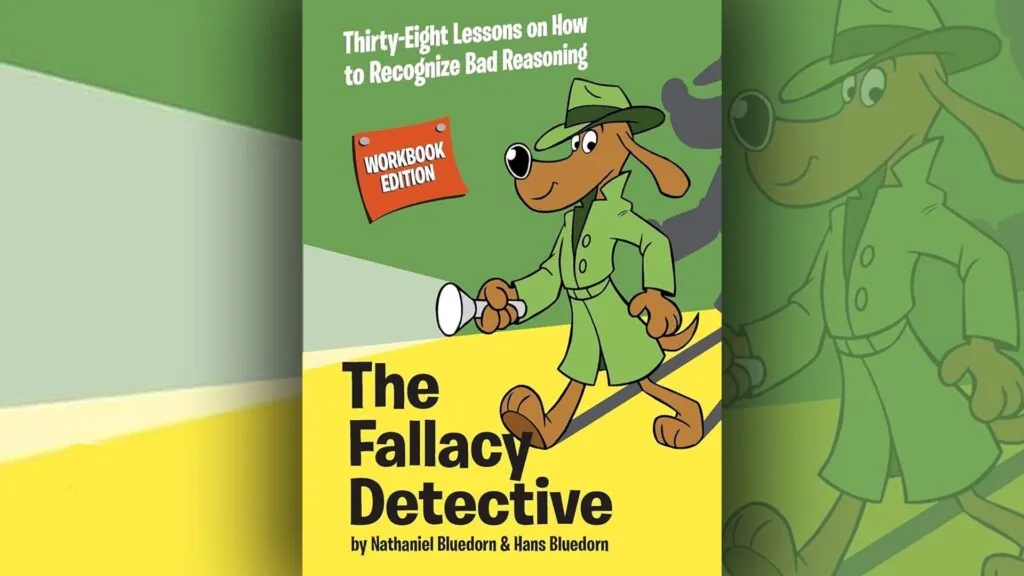“I have no other but a woman’s reason;
I think him so, because I think him so.
That’s Shakespeare poking fun at the irrationality of a female character in his comedy The Two Gentlemen of Verona. It’s the lack of logic that makes this a bit funny.
But that sort of illogic is found just as often among men. How many times have you heard a man pontificate and yet really say no more than “I feel that is what the Bible teaches. I don’t really know why, but that’s what I believe.” In other words, “I think it’s so, because I think it’s so.” Now when it concerns the Bible, that sort of illogic isn’t even a bit funny!
Fun with fallacies
Illogical thinking and logical fallacies came with sin. The two illustrations above are both examples of a fallacy called Circular Reasoning. A classic Peanuts cartoon that you might remember had the following dialogue:
First Panel
Lucy: “You don’t believe me, do you? Well it’s a scientific fact that girls are smarter than boys.”
Linus wisely say nothing
Second Panel
Lucy: “And do you know who discovered it?”
Again Linus maintains his detachment and says nothing.
Third Panel
Lucy: “Woman scientists!”
Linus loses the argument and his composure.
In this circular argument Lucy asserts girls are smarter than boys because scientists have proven it. We know these scientists are right because they are girls, and girls are smarter! Obviously the comic strip is humorous because of the logical fallacy. So we don’t have to be one hundred per cent logical all the time – we can have some fun with illogic.
Nor must we always draw the same conclusion from the same scenario. I married a beautiful woman. Now, forty years later, she has a few grey hairs and maybe even a wrinkle or two. To me she is more beautiful than ever. You may think that’s illogical, but that’s because you don’t see her the way I do.
I have a son who is convinced Coca Cola has more flavor than Pepsi, but in a blind taste test he always picks Pepsi as the best. That has never changed his conviction, because, as he puts it, “the Coke sample must have been stale.” I shake my head at his pig-headedness – but his delusion is not of material significance.
Nevertheless, logical fallacies came with sin, and it is important to recognize them when they are used to mislead or misrepresent.
Ad Hominem
In the book The Fallacy Detective readers are taught to recognize various techniques used commonly to mislead or misdirect an argument. One of these has a fancy Latin name, Ad Hominem, which means literally “to the person.” In practice it is a personal attack, questioning the motives or the reputation of the opponent, instead of disproving his position. Already in the Garden of Eden we see this technique used successfully. God told Adam and Eve that if they ate from the tree of the knowledge of good and evil they would surely die. Satan denied this, and claimed that God had a hidden motive to lie to Adam and Eve – Satan attacked God’s character: “You will not surely die. For God knows that when you eat of it your eyes will be opened and you will be like God knowing good evil.” An absolute lie, but in Eve’s eyes God’s credibility has been undermined and she falls for Satan’s whole scenario.
In politics we see this technique used so often that the term “smear campaign” has become part of our vocabulary
Red Herring
Another frequently used tactic is the Red Herring, an irrelevant point brought in to divert the attention from the real problem or matter at hand. A red herring is a dead fish, an over-ripe dead fish, which a trainer uses to test tracking dogs. The dog is to follow the moose trail, or whatever you’re tracking, and not be diverted by the scent of the red herring that has been dragged across the primary trail.
Now reflect on the behavior of Moses when the angel of the LORD appeared to him in flames of fire from within a bush. God has for him an assignment that Moses does not want. Does he say so? Oh no! “Who am I that I should go to Pharaoh…?” “What if they do not believe me or listen to me…?” “I have never been eloquent… I am slow of speech.” Finally, after God has armed him with an assortment of signs and miracles to overcome all his so-called objections, Moses reveals the real problem – he just does not want to go: “O LORD, please send someone else to do it.” That’s what it was all about! The objections were just red herrings!
As kids we have all use this tactic in its most elementary form. Mom asks “How come your boots have water in them again?” The reply invariably is something like “Oh mom, you ought to see Johnny’s. His boots were filled right to the top.”
Genetic Fallacy
The Genetic Fallacy is another personal attack fallacy. Yet it does not attack the person, but attacks the argument for where it came from: it condemns the argument because of where it began, how it began, or who began it. For example, a couple of years ago I read an excellent article on biblical headship. It was good solid scriptural material. Yet it was criticized by a few because it had been written by a bachelor.
On one occasion Moses too received that sort of criticism. Two Hebrew men were fighting and Moses asked the one in the wrong “Why are you hitting your fellow Hebrew?” The man avoided the question by criticizing the source: “Who made you ruler and judge over us? Are you thinking of killing me as you killed the Egyptian?”
A few years ago I listened to author Scott Klusendorf speak eloquently against abortion. Said one woman in the audience: “What do you know about this? You are not a woman.” She found it necessary to attack the person who brought the message because she was unable to undermine the message itself.
Faulty Appeal to Authority
One fallacy that is of particular importance to us as Christians is the Faulty Appeal to Authority. In our debates and discussions we, as Christians, properly appeal to the authority of the Word of God. Similarly, we use quotes from The Heidelberg Catechism, The Canons of Dort or The Apostles’ Creed, again quite properly because they have an authority derived from their faithfulness to the Scriptures. Likewise, we quote Synod decisions as authoritative because, as stated in Article 31 of the Church Order, “whatever may be agreed upon by a majority vote shall be considered binding (i.e. authoritative), unless it be proved to be in conflict with the Word of God.”
All of these are examples of a proper appeal to authority. A faulty appeal to authority, for example, is demonstrated by the Pharisees when they appealed to the traditions of men as authoritative. In Mark 7 we read of one such tradition: goods that could have been used to support needy parents could be withheld from them by pledging the goods to the temple service. Such a pledge did not have to specify a date of fulfillment. Thus the unfaithful son continued to profit from the property withheld from his parents. It was all quite legal according to the tradition of the elders as taught by the Pharisees.
Christ warned them that their teachings were a faulty appeal to these traditions as authoritative, because these traditions were in conflict with God’s Word. He said to them “…Moses said, ‘Honor your father and your mother,’ …but you say that if a man says to his father or mother: ‘whatever help you might have received from me is a gift devoted to God’, then you no longer let him do anything for his father or mother. Thus you nullify the word of God by your tradition that you have handed down…”
In everyday discussions we have all run into the same difficulty. “We’ve always done it that way” is sometimes the final determination, no matter what the pros or cons of the considerations.
More frequently a faulty appeal to authority is an appeal to someone who has no special expertise in the area being discussed. Simply put, if you want to quote someone on the best way to treat an enlarged prostate, quote an urologist, not a young auto young mechanic who has neither studied nor experienced the problem.
Yet that sort of thing happens all the time. Movie stars tell us about the benefits of particular toothpaste, hockey players hype the nutrition value of a popular cereal, or bishops are interviewed about military strategy or economic plans.
The Either-Or Fallacy
In this short essay we only have room to tackle one more bit of illogical thinking – the Either-Or fallacy (in their book, The Fallacy Detective, the authors tackle about two dozen different fallacies). When someone asserts that we must choose between two things, when in fact we have more than two alternatives, he is using this fallacy. You’ve heard or used it, I’m sure: “If I do the chores I won’t be able to finish my homework and the teacher will fail me.” One of the options, failing, is so absurd or unthinkable that we are being manipulated to choose the other option. This fallacy is obvious to any experienced mother. She realizes that there is another possibility: Don’t procrastinate, and you’ll be able to do both.
Conclusion
So what’s the point of all this? Every day we are faced with questionable logic in our secular newspapers and even in our Christian publications. Often we accept their conclusions intuitively, because our own reasoning skills are very poor. Learning to recognize the most common logical fallacies will enable us to listen and to read more critically and analytically. Forewarned is forearmed!
This was originally published in the July/August 2004 issue under the title “Forewarned is forearmed: how to recognize the most common logical fallacies.”












